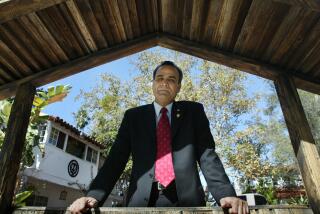$736,935 in Stock-Trading Profits to Be Paid Back : * Securities: Former president of Southland Communications Inc. of Santa Ana settles SEC charges of price manipulation.
- Share via
SANTA ANA — The former president of a Santa Ana paging company has agreed to pay back $736,935 in stock-trading profits to settle civil charges that he manipulated the company’s stock price, the Securities and Exchange Commission said Tuesday.
Ahmad Bayaa also agreed to resign as president of Southland Communications Inc., to pay $137,248 in interest fees and to place his 921,000 shares in company stock in a custodial account over which he will have no control, said Daniel R. Schnipper, SEC senior counsel in New York.
“We received the total amount, all the relief we sought in the lawsuit,” Schnipper said. “It is a disgorgement of ill-gotten gains.”
Under the settlement, Bayaa will be barred for 18 months from being a director or officer of any publicly traded company. Although he admitted no wrongdoing, Bayaa also agreed not to violate securities laws in the future, Schnipper said.
Bayaa did not return calls seeking comment Tuesday. But Robert Rieders, an attorney for Bayaa, disputed the SEC official’s use of the term ill-gotten gains, noting that the settlement document did not contain that phrase.
Bayaa resigned Jan. 17 as president but remains an employee of Southland Communications, which does business as National Paging.
Philip J. Scalzo, who replaced Bayaa, could not be reached for comment Tuesday. The company has not disclosed Bayaa’s current job title.
The settlement ends a lawsuit filed by the SEC in May, 1990, that accused Bayaa and five others of scheming to corner 83% of Southland Communications stock and manipulating the company’s share price for their own purposes.
While Southland Communications was reporting severe financial problems in the spring of 1990, its stock price inexplicably rose from $8.75 a share to $16.75 from March 13 to April 3. Southland issued press releases saying it knew of no reason for the unusual activity. The SEC halted trading April 4, 1990.
A month later, the SEC filed a lawsuit in federal court in New York accusing Bayaa and five others of conspiring to manipulate the company’s stock price. The SEC suit said the stock manipulation was part of a scheme by Bayaa and the other defendants to outmaneuver a network of short sellers--an investment strategy in which the investor hopes to profit by betting that a stock price will fall.
Bayaa tried to manipulate Southland’s stock to keep his company afloat so he could sell it at a huge profit, the SEC said.
Bayaa, a Palestinian refugee who moved to the United States in the 1970s, founded Southland in 1981 to provide customers with radio paging services that allow them to receive messages away from the office. The company went public in 1987.
By late 1989, the company was hurting from heavy competition and the costs of investing in paging technology. For the quarter ended Jan. 31, 1990, the company reported a loss of $324,129, based on sales of $1.2 million.
The SEC suit alleged that, as early as January, 1989, Bayaa had secretly acquired a stake in Southland far in excess of 5%--the level at which reports must be filed with the SEC. After realizing that the stock was vulnerable to a sudden selloff in 1990, Bayaa allegedly withheld from the market the shares that he secretly controlled, helping to drive up the company’s stock price.
In August, 1991, the SEC won default judgments against three co-defendants: Abdul Rahman Deeb, a San Diego oil consultant; Francois Alhaj, an oil consultant in Dubai, capital of United Arab Emirates, and Lebanese oilman Ramzia Kriedly. A fourth defendant, Ziad Twal, a financial adviser in Jordan, consented to a judgment that required no fine in September, 1991, Schnipper said.
Civil charges are pending against Shaw Tehrani, an Atlanta stockbroker who allegedly helped Bayaa disguise the extent of his holdings in Southland Communications. Tehrani allegedly helped Bayaa arrange to have the stock placed in accounts in others’ names that Bayaa secretly controlled.
The $736,935 settlement amount is considered the amount of profits that Bayaa made on stock transactions from January, 1989, to May 14, 1990, the settlement order said.
Scalzo, a consultant and former Hewlett-Packard Co. manager who replaced Bayaa, said last week that Bayaa is still employed by Southland but not as an officer.
“He decided it was time to make a change in the company for a more experienced manager,” Scalzo said last week, before the SEC settlement was announced.
Southland has been struggling since the SEC suit was filed. It employs 38 people, down from 70 in 1990. It has 40,000 subscribers who lease the company’s pagers, down from more than 48,000 in 1990.
Southland Communications
The Securities and Exchange Commission alleged in a civil lawsuit that former Southland Communications President Ahmad Bayaa conspired to manipulate the company’s stock price. Without admitting guilt, Bayaa agreed to settle the charges Tuesday, ending nearly two years of litigation.
January, 1989, to August, 1989: Bayaa, Southland Communications’ president, and broker Shaw Tehrani allegedly gain secret control of more than 70% of Southland stock through accounts in names of friends, family and acquaintances.
November, 1989: Bayaa, according to SEC officials, misrepresents the company’s prospects by saying he rejected a buyout offer of $17 a share in hopes of attracting a $25-a-share bid. Southland shares are trading at $9 a share.
Jan. 11, 1990: Southland annual report contains an auditor’s statement saying “losses from operations and working capital deficiency raise substantial doubt about the entity’s ability to continue as a going concern.”
March 3, 1990: An anonymous evaluation appears on Wall Street recommending that investors take short positions, or speculate on a drop in price, in Southland stock. Bayaa and Tehrani allegedly react by aggressively moving to withhold shares from the market to drive prices up.
March 13, 1990: Southland stock bidding reaches $8.75 a share.
March 14, 1990: Southland issues a press release saying it is unaware of any developments that could account for the increase in trading volume. Tehrani tells a broker that there is no more stock left to sell short; the stock soars 49%.
March 29, 1990: Southland announces that its private placement has been delayed. The company again says it is not aware of any development that could prompt the high trading volume.
April 3, 1990: Southland stock closes at $16.75.
April 4, 1990: The SEC suspends trading for 10 days.
May 14, 1990: The SEC files a civil lawsuit against Bayaa and several others, alleging conspiracy to manipulate the company’s stock. Motorola Corp. sues Southland to recover money for pagers it sold to the company.
May 16, 1990: National Assn. of Securities Dealers removes Southland stock from the NASDAQ listing.
Jan. 17, 1992: Bayaa resigns as Southland president.
Jan. 28, 1992: Bayaa, without admitting wrongdoing, agrees to pay $736,935 to settle the SEC suit.
Source: Securities and Exchange Commission
More to Read
Sign up for Essential California
The most important California stories and recommendations in your inbox every morning.
You may occasionally receive promotional content from the Los Angeles Times.













